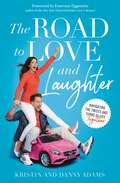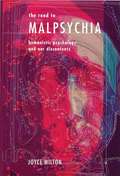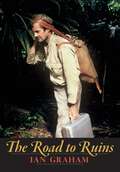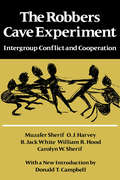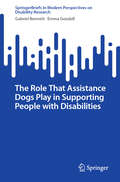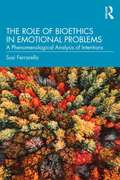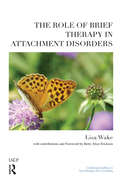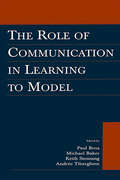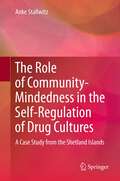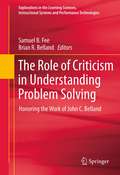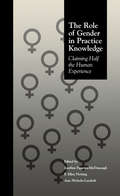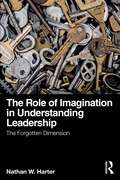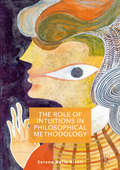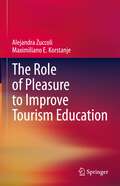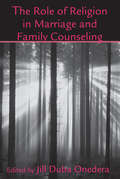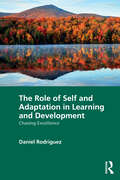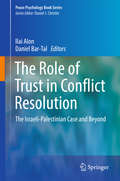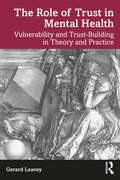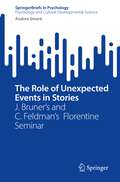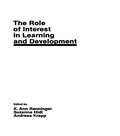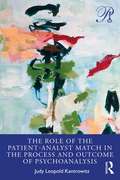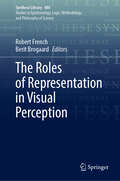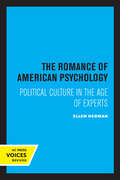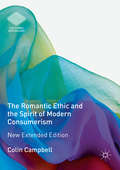- Table View
- List View
The Road to Love and Laughter: Navigating the Twists and Turns of Life Together
by Danny Adams Kristin AdamsWhat's the secret to keeping love alive and full of laughter? Kristin and Danny Adams, the couple behind numerous hilarious viral lip sync videos, draw from their own experience in marriage and entertainment to encourage you to live loudly, love radically, and laugh uncontrollably.Every relationship needs plenty of love and laughter. But how do you keep the fun going when the road gets hard? Viral video creators Kristin and Danny Adams's journey has involved more "heated fellowship" than their hilarious lip sync videos might lead you to think. Kristin and Danny invite you to:Turn roadblocks into opportunities for growth, wisdom, and even laughterHave faith in God to sustain you in difficult times and bring back your joyLet go of the fear of change and find courage to face all of life togetherFace the "laugh blockers" that get in the way of the joy of connectionRediscover the joy of your unique connection for a deeper and more fulfilling marriage journey."You will come away changed. . . . This is a must-read!" -- Jefferson and Alyssa Bethke"With humor and so much wisdom, this story will leave you inspired and feeling like you're not alone." -- Jeremy and Audrey Roloff
The Road to Malpsychia: Humanistic Psychology and Our Discontents
by Joyce MiltonThe Road to Malpsychia charts the rise and fall of one of the most significant cultural movements of our time. It is a story filled with character and anecdote and also with daunting implications for the secular souls left stranded by the failure of what Maslow once called the religion of human nature.
The Road to Ruins
by Ian GrahamFor anyone who ever wanted to be an archaeologist, Ian Graham could be a hero. This lively memoir chronicles Graham's career as the last explorer and a fierce advocate for the protection and preservation of Maya sites and monuments across Mexico, Guatemala, and Belize. It is also full of adventure and high society, for the self-deprecating Graham traveled to remote lands such as Afghanistan in wonderful company. He tells entertaining stories about his encounters with a host of notables beginning with Rudyard Kipling, a family friend from Graham's childhood.Born in 1923 into an aristocratic family descended from Oliver Cromwell, Ian Graham was educated at Winchester, Cambridge, and Trinity College, Dublin. His career in Mesoamerican archaeology can be said to have begun in 1959 when he turned south in his Rolls Royce and began traveling through the Maya lowlands photographing ruins. He has worked as an artist, cartographer, and photographer, and has mapped and documented inscriptions at hundreds of Maya sites, persevering under rugged field conditions. Graham is best known as the founding director of the Corpus of Maya Hieroglyphic Inscriptions Program at the Peabody Museum of Archaeology and Ethnology, Harvard University. He was awarded a MacArthur Foundation genius grant in 1981, and he remained the Maya Corpus program director until his retirement in 2004.Graham's careful recordings of Maya inscriptions are often credited with making the deciphering of Maya hieroglyphics possible. But it is the romance of his work and the graceful conversational style of his writing that make this autobiography must reading not just for Mayanists but for anyone with a taste for the adventure of archaeology.
The Robbers Cave Experiment: Intergroup Conflict and Cooperation. [Orig. pub. as Intergroup Conflict and Group Relations]
by Jack White Muzafer Sherif Carolyn W. Sherif William R. Hood O. J. HarveyOriginally issued in 1954 and updated in 1961 and 1987, this pioneering study of "small group" conflict and cooperation has long been out-of-print. It is now available, in cloth and paper, with a new introduction by Donald Campbell, and a new postscript by O.J. Harvey.In this famous experiment, one of the earliest in inter-group relationships, two dozen twelve-year-old boys in summer camp were formed into two groups, the Rattlers and the Eagles, and induced first to become militantly ethnocentric, then intensely cooperative. Friction and stereotyping were stimulated by a tug-of-war, by frustrations perceived to be caused by the "out" group, and by separation from the others. Harmony was stimulated by close contact between previously hostile groups and by the introduction of goals that neither group could meet alone. The experiment demonstrated that conflict and enmity between groups can be transformed into cooperation and vice versa and that circumstances, goals, and external manipulation can alter behavior.Some have seen the findings of the experiment as having implications for reduction of hostility among racial and ethnic groups and among nations, while recognizing the difficulty of control of larger groups.
The Role That Assistance Dogs Play in Supporting People with Disabilities (SpringerBriefs in Modern Perspectives on Disability Research)
by Emma Goodall Gabriel BennettDogs have long been recognised as valuable companions for people with disabilities. In this book, readers will learn about how dogs can improve the quality of life for people with physical, sensory, and mental disabilities. Using participant and expert insights, this book explores the benefits of dogs, including how they can increase independence, improve emotional wellbeing, and enhance social connections. Whether you are a person with a disability, a caregiver, a healthcare professional, or simply interested in learning more about the remarkable ways in which dogs can support people with disabilities, this book offers a compelling and informative read
The Role of Bioethics in Emotional Problems: A Phenomenological Analysis of Intentions
by Susi FerrarelloFollowing up from the previous book, Human Emotions and the Origins of Bioethics, thisvolume focuses on four psychological problems, anxiety, narcissism, restlessness,and emotional numbness, and explores how these problems influence bioethical issues and what bioethics can do to fix them. The Role of Bioethics in Emotional Problems presents a phenomenological exploration ofemotional intention and describes how one’s choices can determine a better relationship tothemselves and their community. Not only does this book provide the reader with an exhaustive account of the philosophical and psychological meaning of practical intentionality within Husserl’s phenomenology, but it also applies Husserl’s ethics to contemporary studies of human emotions and bioethical problems. Offering a non-reductionist model for an interdisciplinary inquiry into an emotional experience, it integrates clinical practice and articulates foundational knowledge of human emotional life at a professional level. Aimed at students of philosophy, psychology, psychotherapy, and bioethics, this book is a unique phenomenological dialogue between these disciplines on emotional well-being.
The Role of Brief Therapy in Attachment Disorders (The United Kingdom Council for Psychotherapy Series)
by Lisa WakeThe Role of Brief Therapy in Attachment Disorders provides a comprehensive summary of the range of approaches that exist within the brief therapy world, including Cognitive Analytic Therapy, Cognitive Behavioural Therapy, Eye Movement Desensitisation and Reprocessing, Ericksonian Therapy, Neurolinguistic Psychotherapy, Provocative Therapy, Rational Emotive Behaviour Therapy, and Self Relations Therapy. Historically, many of the founders of these therapies commenced their psychotherapy careers as psychodynamic or systemic therapists, and have changed their allegiance to briefer therapies, viewing these as more respectful and offering greater potential for assisting the client to change through an outcome-oriented approach.
The Role of Communication in Learning To Model
by Keith Stenning Andrée Tiberghien Michael Baker Paul BrnaIn this book, a number of experts from various disciplines take a look at three different strands in learning to model. They examine the activity of modeling from disparate theoretical standpoints, taking into account the individual situation of the individuals involved. The chapters seek to bridge the modeling of communication and the modeling of particular scientific domains. In so doing, they seek to throw light on the educational communication that goes on in conceptual learning. Taken together, the chapters brought together in this volume illustrate the diversity and vivacity of research on a relatively neglected, yet crucially important aspect of education across disciplines: learning to model. A common thread across the research presented is the view that communication and interaction, as fundamental to most educational practices and as a repository of conceptual understanding and a learning mechanism in itself, is intimately linked to elaborating meaningful, coherent, and valid representations of the world. The editors hope this volume will contribute to both the fundamental research in its field and ultimately provide results that can be of practical value in designing new situations for teaching and learning modeling, particularly those involving computers.
The Role of Community-Mindedness in the Self-Regulation of Drug Cultures
by Anke StallwitzThis book analyzes heroin users and the drug subculture on the Shetland Islands, an area known for its geographical remoteness, rural character and relative wealth. It fills the scientific gap created by the conventional research in heroin research, which is usually conducted in urban areas and relies on treatment and prison populations. Based on qualitative, in-depth interviews with twenty-four heroin users, this book depicts and analyzes the nature and historical development of the local heroin scene. It illustrates the features and internal structures of the subculture, and it examines the manner in which both are influenced by the location-specific geographical, cultural and socio-economic conditions. It thus reveals complex causal associations that are hard to recognize in urban environments. Complete with a list of references used and recommendations for future research, this book is a vital tool for progressive and pragmatic approaches to policy, intervention and research in the field of illicit drug use.
The Role of Criticism in Understanding Problem Solving
by Samuel Fee Brian BellandIn 1991, Denis Hlynka and John Belland released Paradigms Regained, a well received reader for graduate students in the field of educational technology. The Role of Criticism in Understanding Problem Solving updates some of those ideas initially proposed in Paradigms Regained, and extends the conversation into the contemporary discourse regarding problem based learning (PBL). Paradigms proposed the idea of criticism as a third method for the conduction of educational research, the first two being qualitative and qualitative. The concept of criticism as a tool for research is not well established in educational technology, although it is well established in other educational research traditions such as Curriculum Studies. Unfortunately, it is not always clear how criticism can be applied. This book views criticism as a way to step back and look at an educational intervention within educational technology through a particular critical lens. Criticism is viewed as a valuable approach to guiding meta analyses and theoretical studies, serving to prevent the proverbial "spinning of the wheels" that often happens in educational research. By indicating new potential research questions and directions, criticism approaches can invigorate educational research. This book revisits the ideals of criticism in order to establish their usefulness for studying educational technology interventions to support problem based learning. First, a few foundational chapters set the stage for the conversations on criticism. Then, the role criticism can play in enhancing analysis and interpretation of the PBL literature is explored. Finally, case studies addressing the central concepts of the text are presented and dissected. This book represents a complete overhaul and rethinking of the use of criticism as a method for understanding and furthering the research area of PBL within the field of Educational technology.
The Role of Gender in Practice Knowledge: Claiming Half the Human Experience (Social Psychology Reference Series #Vol. 1086)
by F. Ellen Netting Josefina Figueira-McDonough Ann Nichols-CaseboltFeminist critiques of the social sciences are based on the assumption that because the social sciences were developed for the most part by white, middle-class, Western men, the perspectives of women were ignored. This book offers an approach for integrating gender-related content into the social work curriculum. The distinguished contributors discuss the shortcoming of dominant knowledge, address the pressing need for a gender-integrated curriculum, consider the pedagogies consistent with the implementation of an integrate curriculum, address specific areas in social work education, assessing content, and assumptions, and discuss strategic issues for the implementation of curricular knowledge.
The Role of Imagination in Understanding Leadership: The Forgotten Dimension
by Nathan W. HarterThis book presents a series of fascinating investigations into the role that the imagination plays in studying and practicing leadership. It explains how using the imagination is integral to both the study and practice of leadership itself. Each study presented began as distinct and conceptually separable and is eloquently tied together by the author through the lens of imagination. This volume outlines the role of the imagination in understanding (a) one’s self, as well as other people, (b) the social groups to which one belongs, (c) the dynamics by which these groups change, (d) the conceptual structures we use to determine boundaries, and (e) the role of ritual ceremonies such as legislative committee hearings. In so doing, it offers novel insights that will encourage the reader to consider their own understanding and study of leadership. The Role of Imagination in Understanding Leadership will appeal to scholars and advanced students in the field of Leadership Studies, including graduate students studying leadership.
The Role of Intuitions in Philosophical Methodology
by Serena Maria NicoliThis book focuses on the role of intuition in querying Socratic problems, the very nature of intuition itself, and whether it can be legitimately used to support or reject philosophical theses. The reader is introduced to questions connected to the use of intuition in philosophy through an analysis of two methods where the appeal to intuition is explicit: thought experiments and reflective equilibrium. In addition, the debate on the legitimacy of such an appeal is presented as connected to the discussion on the nature of the aims and results of philosophical inquiries. Finally, the main tenets and results of experimental philosophers are discussed, highlighting the methodological limits of such studies. Readers interested in the nature of intuition in philosophy will find this an invaluable and revealing resource.
The Role of Pleasure to Improve Tourism Education
by Maximiliano E. Korstanje Alejandra ZuccoliThis book discusses how pleasure, as an emotional motivation, can play a leading role in improving the learning of new cognitive skills and abilities. Set in a research center orientated to innovate educative techniques for optimizing the learning process, this case study is focusing on the power of pleasure (joy) as a strategy to better the standard education systems in Argentina and beyond.This editorial project is based on an efficient experiment known as “PANCOE” where pre-graduate students of tourism bachelor at the University of Palermo, Argentina, were subject to different pleasurable experiences mainly marked by eating, tasting dishes and non-alcohol drinks while cooking and kneading bread pieces. PANCOE aims to integrate students' senses with their emotions, academic performance, and digital platforms. PANCOE devotes efforts to transforming negative feelings like fear into positive ones like joy. As an outcome, students who had taken part in PANCOE not only obtained higher degrees but also completed their studies with a bachelor's degree. Therefore, PANCOE situates as a promising and exciting tourism education method to better the academic performance of low-grade students in tourism and to bring creativity to the tourism classroom for all students.
The Role of Religion in Marriage and Family Counseling (Routledge Series on Family Therapy and Counseling)
by Jill Duba OnederaReligion can play a vital role in the way people relate to each other, particularly with interpersonal dynamics within a family. The role of a couple or family’s religion(s) in the counseling room is no less important. This book provides practitioners with an overview of the principles of the major world religions, with specific focus on how each religion can influence family dynamics, and how best to incorporate this knowledge into effective practice with clients.
The Role of Self and Adaptation in Learning and Development: Chasing Excellence
by Daniel RodriguezThis book introduces readers to Psychoadaptation—a general model of change that stresses the importance of experiencing disequilibrium in the development of a healthy Self—and applies it to a range of examples across the academic, sport, and health domains. Built upon his studies of human development and learning, Daniel Rodriguez offers an overview of a model of change with a specific focus on the development of Self and conceptions of Self. The author begins by focusing on academic topics such as conducting research, teaching, and being a student, before highlighting examples from sport and health. With a clear and engaging tone, each chapter highlights how the theory behind Psychoadaptation can be applied across a variety of contexts and in the modern world. The result is a solid balance of scientific theory and practical application that readers can relate to their own circumstances and research. Offering a unique conceptualization to development, learning, and behavior change, this is a useful resource for students and scholars within these areas, as well as clinicians working in the fields of health and sport. It will also benefit individuals looking to embark upon their own journeys to Self-development.
The Role of Trust in Conflict Resolution
by Daniel Bar-Tal Ilai AlonBuilt on the premise that trust is one of the most important factors in intergroup relations, conflict management and resolution at large, this volume explores trust and its mechanisms and operations in the Israeli-Palestinian conflict. Significantly, this volume focuses not only on the nature of trust and distrust in the Israeli-Palestinian conflict, but it also explores how it is possible to build and increase trust on both sides in the conflict, a necessity in order to advance the stalled peace process. As trust is a concept that is interdisciplinary by nature, so are this volume's contributors: sociologists, philosophers, sociologists, social psychologists, political scientists, as well as experts in the Middle East, Islam, Judaism and the Israeli-Palestinian conflict bring together real multidisciplinary perspectives that complement each other and then provide a comprehensive picture about the nature of trust and its ramification and implications for the Israeli-Palestinian conflict. Divided into four parts, the volume begins with by examining the theoretical basis of trust research from multiple perspectives. Then, it presents chapters on trust, mistrust, and trust-building in other conflicts around the world. The third part is a unique feature of this volume as it takes a contextual approach: it emphasizes the importance of particular cultural and religious considerations on both sides of the conflict. Finally, the thrust of the book is examined in the next section. Part IV discusses and analyses various aspects of trust, and specifically distrust, in the context of the Israeli-Palestinian conflict. Significantly, the chapters of this part take the perspectives of the participants in the conflict: Israeli Jews, Palestinians and Israeli Arabs. Finally, the volume concludes by providing an integrative perspective based on the principles of social and political psychology. An important goal of this volume is to not only explore trust and distrust in an intractable conflict, but also to provide practical implications to advance trust building in the two conflict ridden societies--Israeli and Palestinian.
The Role of Trust in Mental Health: Vulnerability and Trust-Building in Theory and Practice
by Gerard LeaveyThis book offers a comprehensive examination of trust and its relationship with mental illness and wellbeing.Engaging with a broad range of mental health research, theory, and practice through various transdisciplinary theoretical models of trust, this book highlights the social and family contexts surrounding the making and breaking of trust and mental health. It examines various sociological conceptual and theoretical frameworks of risk and trust while also engaging with evolutionary perspectives on the human need for cooperation and trust. The author describes how, in a world of constant connectivity, the drawing of boundaries assigns some people as strangers, using stigma as a form of power. The book concludes by considering the future of mental health and where trust-building may be possible. Each chapter is interspersed with observations and insights from the author’s personal research covering many populations, communities and issues over several decades.Drawing on a wide range of interdisciplinary literature, the book will be of interest to mental health practitioners, researchers, and scholars interested in the psychosocial aspects of mental illness and stigma.
The Role of Unexpected Events in Stories: J. Bruner’s and C. Feldman’s Florentine Seminar (SpringerBriefs in Psychology)
by Andrea SmortiThis book stems primarily from the intention to make public the seminar entitled "Narratives and Cultural Psychology" held by J. Bruner and C. Feldman in May 2000 in Florence. This seminar represents the point of view of these two authors, at an important moment in their scientific and human careers, on two themes: narratives and interpretative communities.The central concept on which this book works is the Aristotelian concept of peripeteia which, born in the world of art, is developed by Bruner in the field of cognitive and cultural psychology and by Feldman in the concept of interpretative community.Thus the first purpose of this book is to analyze the role and usefulness of this concept in the study of the world of stories and cultureThe second aim of this book is to explain, clarify and comment on the concept, the theoretical assumptions and the key words used by the two authors, while also exploring the issues addressed. In this way, the author wanted to reflect on what contribution this seminar offers today to the theme of narratives and cultural psychology and what the future prospects might be.This book is aimed at students and scholars interested in exploring the role that stories play in human culture.
The Role of interest in Learning and Development
by Suzanne Hidi K. Ann Renninger Andreas KrappInterest is just emerging as a critical bridge between cognitive and affective issues in both learning and development. This developing "interest" in interest appears to be linked to an increasing concern for studying the individual in context, examining affective variables as opposed to purely structural features of text, analyzing the interrelationship of cognitive and social development, understanding practical applications of theories of motivation, and recognizing the importance of developmental psychology for the study of learning. This book addresses both how individual interest and interest inherent in stimuli (books, text, toys, etc.) across subjects affect cognitive performance. While the book's particular emphasis is on theory-driven research, each of the contributing authors offers a unique perspective on understanding interest and its effects on learning and development. As such, each has contributed a chapter in which particular questions in interest research are described and linked to a clearly stated theoretical perspective and recent findings. Relevant material from the broader literatures of psychology and education are analyzed in the context of these discussions. In addition, the introductory and concluding chapters build on the contributions to the volume by providing the basis of a coherent view of interest across genres such as stories and expository text, and domains as varied as play, reading, and mathematics.
The Role of the Patient-Analyst Match in the Process and Outcome of Psychoanalysis (Psychoanalysis in a New Key Book Series)
by Judy Leopold KantrowitzForewords by Theodore Jacobs and Donnel Stern The Role of the Patient-Analyst Match in the Process and Outcome of Psychoanalysis is a compilation of Judy Kantrowitz’s previously published papers on the patient-analyst "match" and its effect on the process and outcome of psychoanalysis. The match between patient and analyst places attention on the dynamic effect of interactions of character and conflict of both participants on the process that evolves between them—a spectrum of compatibility and incompatibility that is relevant to the analytic work. Classical psychoanalysis had been viewed as a "one-person" enterprise, with one analyst interchangeable with another. Analysts’ experiences of countertransference reactions were viewed as unresolved conflicts, reasons to return to personal treatment, not inevitable and potentially informative about the current analytic work. This view began to shift in the 1980s, with Judy Kantrowitz’s work contributing to the development of the recognition that psychoanalysis was a "two-person" process. In this collection of her most significant papers, Kantrowitz explores the importance of the match, which refers to observable styles, attitudes and personal characteristics that may be rooted in residual and unanalyzed conflicts, triggered in any patient-analyst pair. Match is neither a predictive nor static concept. Rather it refers to the unfolding transaction that itself that may shift and change during the course of analytic work. Pulling together the history of the shift in theory from the one-person to two-person understanding of the psychoanalytic enterprise, The Role of the Patient-Analyst Match in the Process and Outcome of Psychoanalysis will be of great interest to contemporary psychoanalysts.
The Roles of Representation in Visual Perception (Synthese Library #486)
by Berit Brogaard Robert FrenchThis volume contains new papers addressing a number of new and traditional issues pertaining to the roles of representations in visual perception.Among these issues is the one concerning the nature of the perceptual state itself – e. g. on the issue of whether the perceptual state, like its distal objects, is structured, for instance by possessing a spatial character. Other issues include those of whether at least aspects of the distal object are presented immediately to us visually, whether representation plays any (interesting) role in disjunctivist and naïve realist accounts of visual experience and the relationship among visual perception, attention and representation.The anthology includes a wide variety of positions on the subject of the roles of representations in visual perception, which would help to close the literature gap and will be of interest to scholars from all schools and trends of philosophy of mind.
The Romance of American Psychology: Political Culture in the Age of Experts
by Ellen HermanPsychological insight is the creed of our time. A quiet academic discipline two generations ago, psychology has become a voice of great cultural authority, informing everything from family structure to government policy. How has this fledgling science become the source of contemporary America's most potent ideology? In this groundbreaking book—the first to fully explore the political and cultural significance of psychology in post-World War II America—Ellen Herman tells the story of Americans' love affair with the behavioral sciences. It began during wartime. The atmosphere of crisis sustained from the 1940s through the Cold War gave psychological "experts" an opportunity to prove their social theories and behavioral techniques. Psychologists, sociologists, and anthropologists carved a niche within government and began shaping military, foreign, and domestic policy. Herman examines this marriage of politics and psychology, which continued through the tumultuous 1960s. Psychological professionals' influence also spread among the general public. Drawn by promises of mental health and happiness, people turned to these experts for enlightenment. Their opinions validated postwar social movements from civil rights to feminism and became the basis of a new world view. Fascinating and long overdue, this book illuminates one of the dominant forces in American society. This title is part of UC Press's Voices Revived program, which commemorates University of California Press's mission to seek out and cultivate the brightest minds and give them voice, reach, and impact. Drawing on a backlist dating to 1893, Voices Revived makes high-quality, peer-reviewed scholarship accessible once again using print-on-demand technology. This title was originally published in 1995.
The Romantic Crowd
by Mary FaircloughIn the long eighteenth century, sympathy was understood not just as an emotional bond, but also as a physiological force, through which disruption in one part of the body produces instantaneous disruption in another. Building on this theory, Romantic writers explored sympathy as a disruptive social phenomenon, which functioned to spread disorder between individuals and even across nations like a 'contagion'. It thus accounted for the instinctive behaviour of people swept up in a crowd. During this era sympathy assumed a controversial political significance, as it came to be associated with both riotous political protest and the diffusion of information through the press. Mary Fairclough reads Edmund Burke, Mary Wollstonecraft, William Godwin, John Thelwall, William Hazlitt and Thomas De Quincey alongside contemporary political, medical and philosophical discourse. Many of their central questions about crowd behaviour still remain to be answered by the modern discourse of collective psychology.
The Romantic Ethic and the Spirit of Modern Consumerism: New Extended Edition (Cultural Sociology)
by Colin CampbellOriginally published in 1987, Colin Campbell’s classic treatise on the sociology of consumption has become one of the most widely cited texts in sociology, anthropology, cultural studies, and the history of ideas. In the thirty years since its publication, The Romantic Ethic and the Spirit of Modern Consumerism has lost none of its impact. If anything, the growing commodification of society, the increased attention to consumer studies and marketing, and the ever-proliferating range of purchasable goods and services have made Campbell’s rereading of Weber more urgent still. As Campbell uncovers how and why a consumer-oriented society emerged from a Europe that once embodied Weber’s Protestant ethic, he delivers a rich theorization of the modern logics and values structuring consumer behavior. This new edition, featuring an extended Introduction from the author and an Afterword from researcher Karin M. Ekström, makes clear how this foundational work aligns with contemporary theory in cultural sociology, while also serving as major influence on consumer studies.
